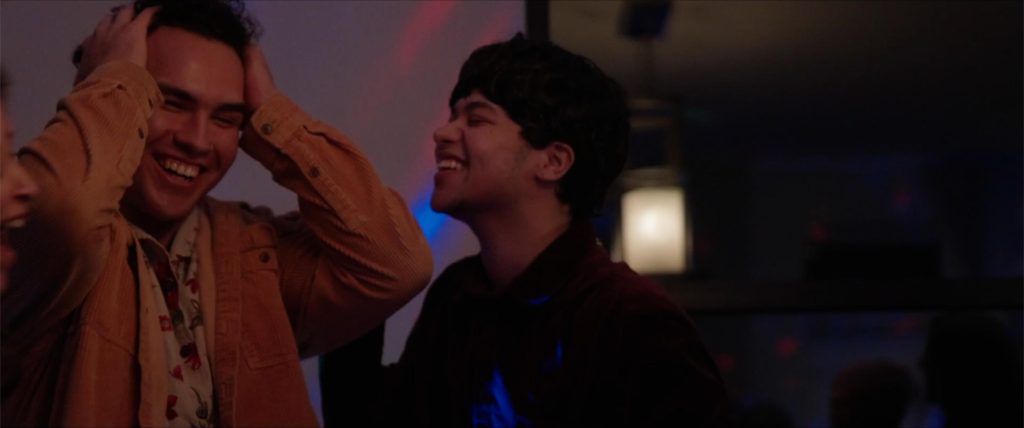Two college students form a powerful bond that challenges their faith, identity, and community in Kabir McNeely’s emotional coming-of-age drama Fallaway. Check out our review, right here.

Kabir McNeely’s debut feature Fallaway is a sensitive and poignant exploration of identity, faith, and the crushing weight of societal expectation. Set within the seemingly liberal landscape of a San Francisco college, the film confronts the lingering pressures placed on young queer individuals trying to find themselves in environments still laced with judgement and repression. With a grounded emotional core and two heartfelt performances at its centre, this is a quietly courageous piece of filmmaking that pulls no punches while refusing to abandon compassion.
At the heart of the story is Caden, played with a soft intensity by Christian Puentes, a freshman entering campus life with the same hopes as many others: to belong, to grow, and to understand who he is. Isolated by his uncertainty and unsure of how to connect, Caden stumbles into a Bible group where he hopes to find community. There, he meets Giovanni, portrayed by McNeely himself, a seemingly confident student who carries his own burdens behind a reserved smile. Their bond is immediate, but unspoken, blooming in shared moments and unvoiced glances before reality threatens to fracture it entirely.
What Fallaway captures so effectively is the feeling of being torn in two directions, of wanting to live truthfully while fearing what that honesty might cost. It is a film about contradictions: between faith and freedom, conformity and rebellion, silence and expression. McNeely draws these lines with subtlety, never vilifying religion outright but instead exposing how belief systems, when manipulated or misinterpreted, can silence the very people they claim to uplift.

The supporting characters serve as extensions of the world pressing in on Caden and Giovanni. The Bible group, which initially appears warm and inviting, gradually reveals its rigidity. Through figures like Pastor Brad and Giovanni’s devout father, the script portrays the insidious way ideology can mask control as care. These figures are not caricatures, but deeply rooted in a culture that equates obedience with virtue and difference with sin. Even the college setting, which should provide a sense of liberation, becomes another space governed by unwritten rules and quiet surveillance.
Despite its micro-budget and brisk runtime, the film makes a lasting impact. Yes, there are moments when the rough edges show — occasional technical limitations and narrative shortcuts that slightly dull the final blow — but these never undercut the sincerity at the film’s core. In fact, they often work in its favour, lending the piece an authenticity that polished productions sometimes lack. You believe these characters because they feel real, not rehearsed.
Puentes gives a heartfelt and convincing performance as Caden, capturing the awkwardness, yearning, and confusion of someone trying to align his beliefs with his feelings. He is especially compelling in moments of silence, when his body language does the talking. McNeely’s portrayal of Giovanni is equally moving, balancing the character’s internalised shame with flickers of warmth and vulnerability. Their chemistry feels honest, never forced, which makes the choices they must face all the more heartbreaking.

The film’s title could not be more apt. Fallaway refers not only to falling from grace, as viewed by a religious lens, but also to falling away from innocence, from certainty, from the protective illusions we cling to. As the story unfolds, it becomes clear that both young men are being forced to choose between survival and selfhood. The consequences of that choice are not dressed up with cinematic flair, but laid bare in raw emotional truth.
Though it runs just over 50 minutes, the film raises questions that linger well beyond its closing frame. It asks us to reflect not just on the personal journey of coming out, but on the systems that make that process so fraught. It reminds us that acceptance cannot be conditional, that belief should never come at the cost of compassion, and that being yourself should not be an act of bravery, but a basic right.
Fallaway is not a flawless film, but it is an essential one. It is an honest and empathetic portrait of a conflict that too many still face, told with grace and conviction by a filmmaker unafraid to confront difficult truths. With this debut, Kabir McNeely establishes himself as a voice worth listening to — not because he shouts, but because he speaks from the heart.
